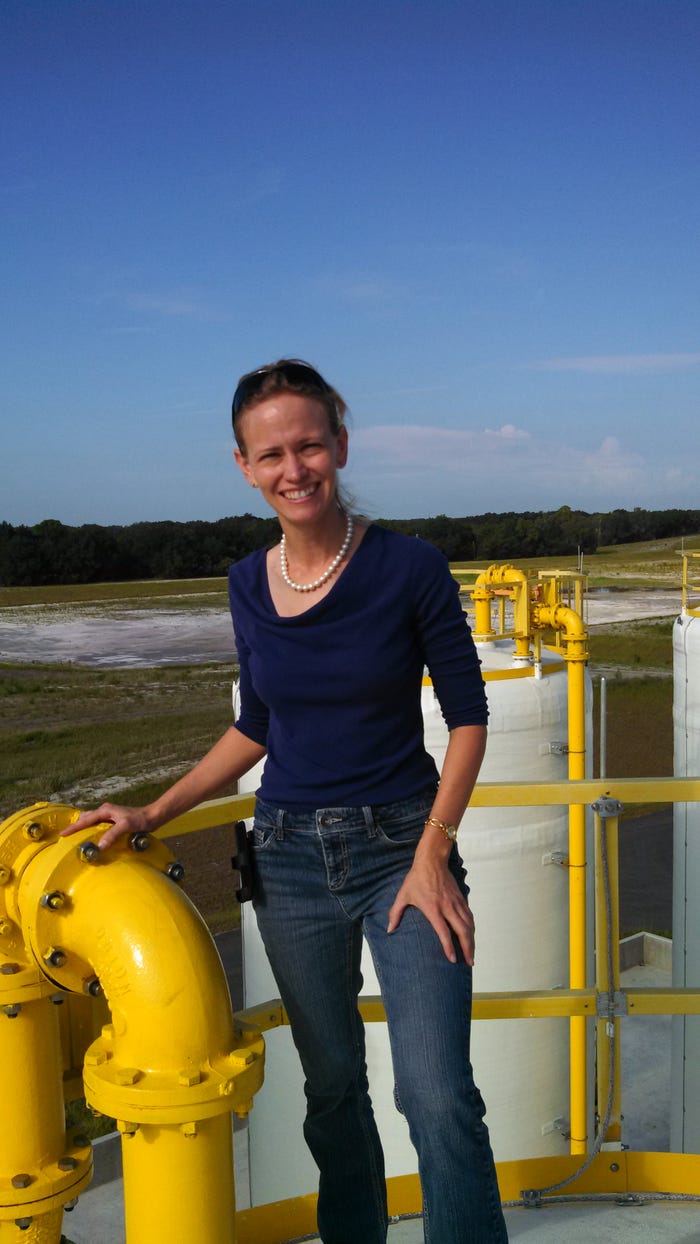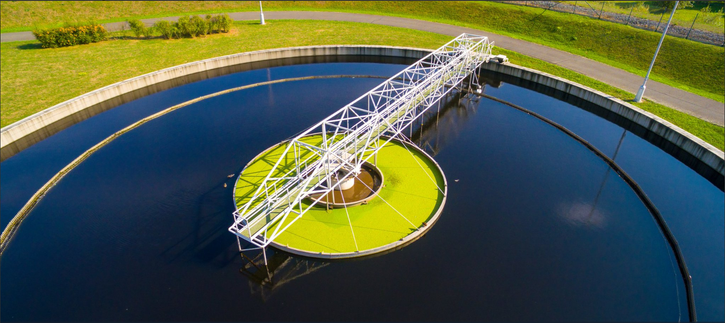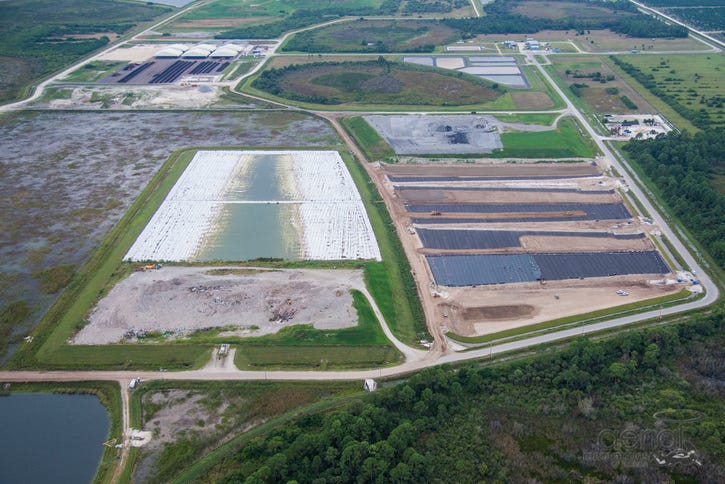Lee County’s Rodriguez Finds Unexpected Yet Rewarding Career in Waste
The 2019 Waste360 40 Under 40 award recipient discusses the differences she’s seen in public and private sectors and what she’s enjoyed about working for each.

Rebecca Rodriguez has grown deep roots in the solid waste management space in the past 17 years. She’s supported both the private and public sectors, rapidly progressing from engineer intern to project manager with an environmental design firm; moving on to a management position with another firm; launching her own consulting company; and working as general manager at a new, large Florida landfill.
Rodriguez has been involved in landmark projects such as a $672 million waste-to-energy (WTE) plant launched in 2015—the first U.S facility of its kind to be built in more than 15 years.
She helped develop landfill gas projects through the Great Recession and declining natural gas prices, meeting headwinds but managing to grow her company. And she’s stood up to other tough conditions, literally weathering three major storms as part of a response team when three hurricanes ripped through central and southwest Florida.
Today, Rodriguez is responsible for environmental compliance, capacity planning and capital improvement project (CIP) development for Lee County Public Utilities in Florida.
“Rebecca is a leader within Lee County Public Utilities and is setting the course for the future of this program with cost-effective, long-term solutions,” says Tobin McKnight, a former Waste360 40 Under 40 awards recipient who has known Rodriguez since 2004, when he worked with her on solid waste management consulting projects at Jones Edmunds & Associates.
McKnight describes Rodriguez as a “go-getter” yet a “quiet leader who inspires others and creates an environment that stimulates positive change and growth.”
We recently sat down with Rodriguez, a 2019 Waste360 40 Under 40 award recipient, who explains an interesting model she’s involved with whereby wastewater management/water services and solid waste management are combined. She talks about differences she’s seen in public and private sectors and what she’s enjoyed about working for each. And she discusses a population boom in Lee County and how she’s helping Lee County Public utilities prepare.

Waste360: How did you end up in solid waste management and get from that entry point to where you are now?
Rebecca Rodriguez: “By accident” seems to be the typical route of entry into our profession. I originally applied at Jones Edmunds for a civil/structural engineering position, which was the field I’d studied in college, and I’d worked for a structural engineer while a student. But the company ended up offering me an engineering position in solid waste. It was an unexpected opportunity but a rewarding one. I got to focus on technical solutions and work with very talented folks in a dynamic environment.
I went on to start Kelner Engineering to work on landfill gas projects and developments. During that time, I expanded into other areas to include solid waste permitting, construction services and general biogas management.
I was part of a team of other small businesses that did construction, engineering and inspection services at a new, private landfill in central Florida. And I continued to work for the owner to manage landfill operations in the startup year.
Later, I managed solid waste and other projects at CDM Smith, which involved supporting client service leaders across Florida and in North Carolina. This company has been driving some of the most innovative projects in the environmental infrastructure industry.
Waste360: Lee County combines the division of solid waste with wastewater and other water-related services. Why?
Rebecca Rodriguez: We’ve been promoting a practice of one organization with the idea being that we are driven to provide optimal service to each other and to the public. Our leadership is actively trying to break down the siloing that can happen in public agencies. Combining the solid waste and utilities groups has been part of that. And we have seen benefits.
Solid waste division is generally smaller than the wastewater/water utility, and sharing resources is efficient. We’ve seen efficiencies in geographic information systems/computer-aided drafting, biosolids hauling, field services, CIP project management and environmental services.
Waste360: Your focus is in solid waste management. But have you also taken on roles on the wastewater/water utility side?
Rebecca Rodriguez: Yes. I spent about 12 months in an acting role as engineering manager for our wastewater/water utility. I loved learning about this side of the environmental infrastructure business. And it’s helped open my eyes to management tools, like asset management, that haven’t been adopted as extensively by solid waste groups.

Waste360: What has it been like to wear so many hats: consultant, entrepreneur, designer, operator and manager?
Rebecca Rodriguez: All the different hats have felt more like a natural progression than big changes. As I’ve moved from one role or project to another, I’ve been very fortunate to see so many sides of our industry. And there’s always been something new to learn.
It’s been helpful to have a broader perspective and not stereotype the “other side,” because I’ve been there, whether that “other side” is the public sector, private or a large or small firm. Our industry faces a number of challenges, and they won’t be solved by any single group. So, having the opportunity to take on different roles and to learn about the roles of other professionals I’ve partnered with has been insightful.
Waste360: How much time have you spent in the public sector and how much time in the private sector? What do you most like about each one?
Rebecca Rodriguez: I have worked mostly in the private sector (about 15 years). I have been on the public side about two-and-a-half years now with Lee County.
The private sector tends to have a broader reach in the large firms and more flexibility in the smaller firms. I’ve been really impressed at the technical expertise and specialties that can be supported in the private sector. It has provided opportunity to take calculated risks on innovative technologies and sometimes the opportunity to be the first to commercially operate new technologies.
About public? Municipal workers are really the ones who make the world turn and keep our communities safe and functioning daily. They are incredibly dedicated and knowledgeable about their communities and programs. In the public sector, we can develop a grassroots idea into a program that can improve the community. And we see the process through from A to Z.
Waste360: Describe Lee County’s integrated solid waste management system and how you are positioning it for success into the future.
Rebecca Rodriguez: This system includes waste-to-energy, construction and demolition recycling, single stream materials recovery facilities, biosolids/mulch composting, hauling services, right-of-way cleanup, household chemical waste, yard waste management and landfills.
We are building on master plan data and analysis for expansion of our system, with a focus on managing our solid waste needs when our population reaches what is projected to be one million in 2040. We will focus on diversion strategies and a combination of landfill and waste-to-energy disposal capacity.

Waste360: What specific challenges are you meeting as you prepare for future growth? How are you addressing them?
Rebecca Rodriguez: Growth is putting pressure on all the environmental industries, especially in Florida. We are working to adequately project needs and balance that with expenditures and operational and organizational changes.
Solid waste professionals are no longer an isolated sector where we focus on disposal only. As we move forward, we are going to have to be part of a resource management strategy that involves a combination of industry, retail and government.
Waste360: What have been some especially interesting moments in your present job?
Rebecca Rodriguez: Participating in hurricane response for Irma and for the 2004 hurricane season in central Florida were interesting and challenging times. Our waste-to-energy facility went down due to damage, and the landfill staff was amazing in the work they did to get the facility ramped up. People were working around the clock to manage more waste while dealing with their own site damage.
Waste360: What can you say about your time as a consultant on Palm Beach County’s waste-to-energy plant—the first to be built in more than 15 years?
Rebecca Rodriguez: I worked on the tail end of the project, completing punch list items and project closeout after the ribbon-cutting, which included addressing challenges tied to HVAC [heating, ventilation and air conditioning], stormwater performance and electrical systems.
The closeout also included obtaining Leadership in Energy and Environmental Design platinum certification for the education center.
Waste360: What is your ultimate goal in your role with Lee County Public Utilities?
Rebecca Rodriguez: To build a team of technical experts and lead them in using their skills to support electronic data-driven operational decisions. Moving from paper management to electronic systems allows us to better aggregate information and make projections to plan for the future.
Waste360: How do you leverage your role on the Solid Waste Association of North America Sunshine Chapter Board of Directors to support the industry?
Rebecca Rodriguez: This role gives me an opportunity to listen to what our members bring up as challenges and to provide platforms for them to discuss solutions. This may be through a conference program or just networking.
What you’re doing today may be the solution that has eluded someone else. I’ve been very fortunate in my career and look forward to advancing the industry and giving other folks a boost in their careers where I can.
About the Author
You May Also Like




.png?width=300&auto=webp&quality=80&disable=upscale)